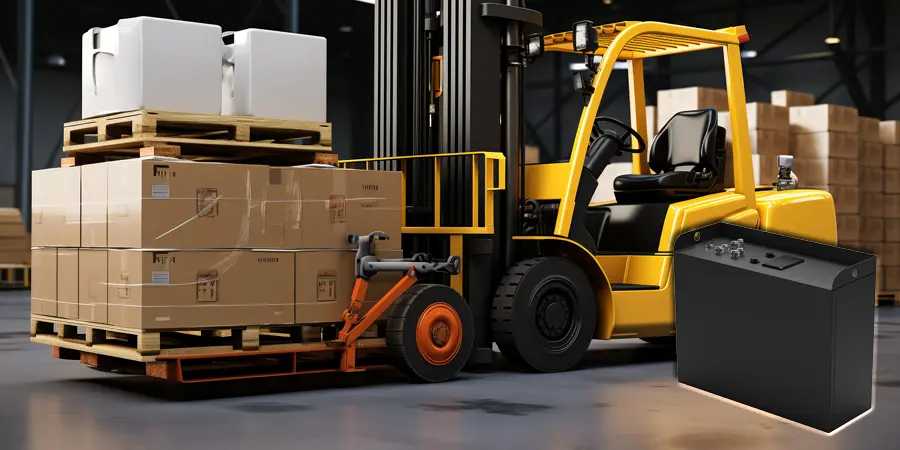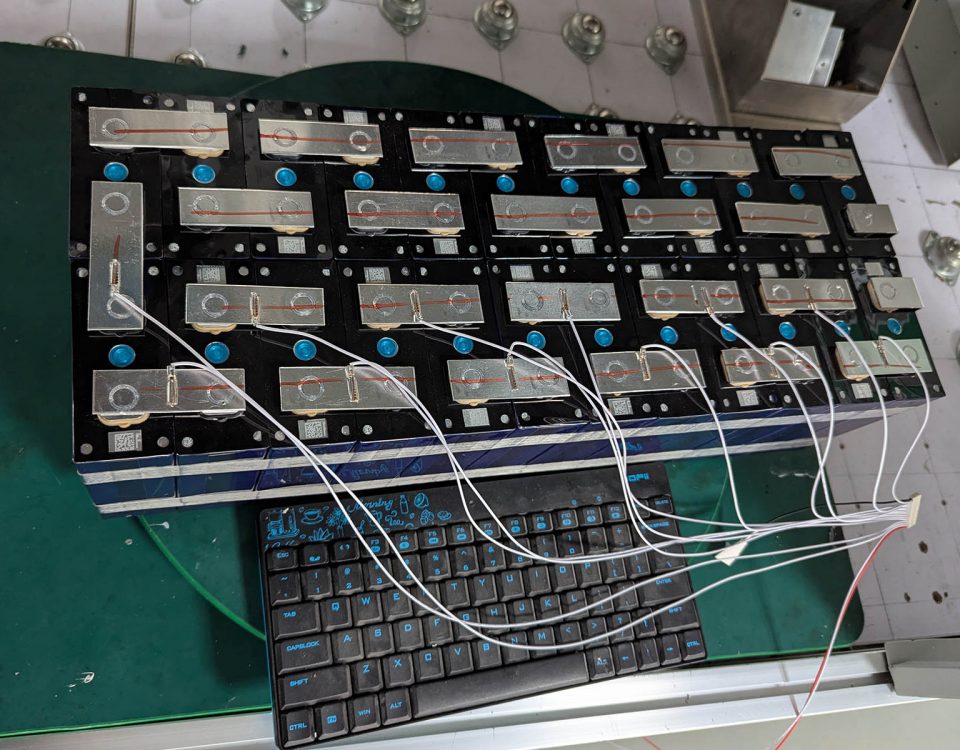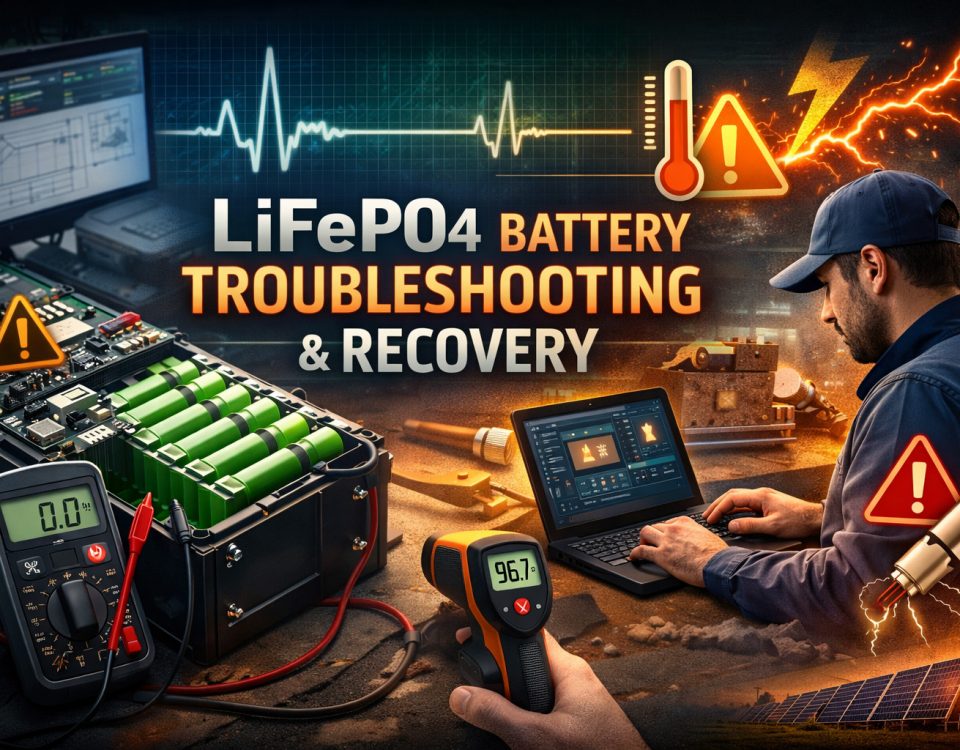ในฐานะที่เป็นกระดูกสันหลังของการดำเนินงานคลังสินค้าและโลจิสติกส์สมัยใหม่ รถยกต้องพึ่งพาแหล่งพลังงานที่เชื่อถือได้อย่างมาก แบตเตอรี่ลิเธียมได้กลายเป็นตัวเลือกอันดับต้น ๆ เนื่องจากมีประสิทธิภาพด้านพลังงานที่เหนือกว่า การชาร์จที่รวดเร็ว และอายุการใช้งานที่ยาวนานกว่าเมื่อเทียบกับแบตเตอรี่ตะกั่วกรดแบบดั้งเดิม อย่างไรก็ตาม เช่นเดียวกับเทคโนโลยีทั้งหมด แบตเตอรี่ลิเธียมก็มีปัญหาเช่นกัน บทความนี้จะเจาะลึกถึงปัญหาทั่วไปกับ แบตเตอรี่ลิเธียมสำหรับรถยก, วิธีการแก้ไขปัญหาเหล่านั้น และกลยุทธ์เพื่อยืดอายุการใช้งานและปรับปรุงประสิทธิภาพการดำเนินงาน
1. ความท้าทายทั่วไปของแบตเตอรี่ลิเธียมสำหรับรถยกและวิธีแก้ไข
(ก) รูปแบบการชาร์จที่ไม่สม่ำเสมอ
หนึ่งในปัญหาที่พบบ่อยที่สุดในการใช้งานรถยกคือการชาร์จแบตเตอรี่ที่ไม่สม่ำเสมอ การชาร์จแบตเตอรี่ลิเธียมไม่เพียงพอหรือมากเกินไปบ่อยครั้งสามารถทำให้ประสิทธิภาพของแบตเตอรี่ลดลงเมื่อเวลาผ่านไป
โซลูชัน:
- ลงทุนใน ระบบจัดการแบตเตอรี่ (BMS): ระบบเหล่านี้ตรวจสอบสถานะการชาร์จของแบตเตอรี่ เพื่อให้แน่ใจว่าไม่ต่ำกว่าระดับที่แนะนำหรือเกินความจุสูงสุด
- ทำตาม ตารางการเรียกเก็บเงินที่มีโครงสร้าง: ให้ผู้ประกอบการรถไฟนำแนวปฏิบัติในการชาร์จไฟที่สม่ำเสมอมาใช้ เช่น การชาร์จไฟระหว่างช่วงพัก
(b) ปัญหาความร้อนสูงเกินไป
แบตเตอรี่ลิเธียมมีความไวต่อการเปลี่ยนแปลงของอุณหภูมิ และการสัมผัสกับอุณหภูมิสูงเป็นเวลานานสามารถเร่งการเสื่อมสภาพทางเคมีได้
โซลูชัน:
- ติดตั้ง สถานีชาร์จไฟฟ้าแบบควบคุมอุณหภูมิ หรือใช้แบตเตอรี่ที่มีระบบจัดการความร้อนในตัว
- หลีกเลี่ยงการสัมผัสโดยตรงกับแหล่งความร้อน เช่น แสงแดดหรือเครื่องทำความร้อนอุตสาหกรรม ในพื้นที่จัดเก็บ
(ค) ความสามารถลดลงตามกาลเวลา
แม้จะได้รับการดูแลอย่างเหมาะสม แบตเตอรี่ลิเธียมอาจประสบกับการลดลงของความจุเนื่องจากการเสื่อมสภาพตามธรรมชาติหรือการคายประจุลึกบ่อยครั้ง
โซลูชัน:
- ใช้ กฎ 80-20: หลีกเลี่ยงการปล่อยประจุแบตเตอรี่ต่ำกว่า 20% และการชาร์จเกินกว่า 80% เพื่อรักษาสุขภาพของแบตเตอรี่ในระยะยาว
- ปรับเทียบ BMS ของแบตเตอรี่เป็นประจำเพื่อให้การอ่านค่าสถานะการชาร์จและความจุถูกต้อง
(ง) ข้อผิดพลาดในการสื่อสารกับอุปกรณ์
แบตเตอรี่ลิเธียมสำหรับรถยกบางครั้งประสบปัญหาการผสานรวมกับรุ่นรถยกที่เก่ากว่า ซึ่งอาจทำให้เกิดประสิทธิภาพที่ไม่สม่ำเสมอหรือข้อผิดพลาดในการสื่อสาร
โซลูชัน:
- ทำงานร่วมกับผู้ผลิตแบตเตอรี่เพื่อให้แน่ใจว่าระบบแบตเตอรี่ลิเธียมและซอฟต์แวร์การปฏิบัติการของรถยกมีความเข้ากันได้
- อัปเกรดเฟิร์มแวร์ของรถยกหากจำเป็นเพื่อปรับปรุงการสื่อสารกับแบตเตอรี่
2. กลยุทธ์ในการยืดอายุการใช้งานแบตเตอรี่และเพิ่มประสิทธิภาพสูงสุด
(ก) ดำเนินการตามแนวทางการชาร์จอัจฉริยะ
การชาร์จที่มีประสิทธิภาพเป็นสิ่งสำคัญในการยืดอายุการใช้งานของแบตเตอรี่ลิเธียม นอกจากการหลีกเลี่ยงการชาร์จเกินแล้ว ควรใช้ประโยชน์จากระบบชาร์จอัจฉริยะที่ช่วยปรับความเร็วในการชาร์จให้เหมาะสมโดยไม่ทำให้แบตเตอรี่ร้อนเกินไป
(ข) ผู้ให้บริการเดินรถไฟเพื่อการใช้อย่างถูกต้อง
มักถูกมองข้าม นิสัยของผู้ใช้งานมีบทบาทสำคัญต่ออายุการใช้งานของแบตเตอรี่. ฝึกอบรมผู้ขับรถยกให้ทำตามนี้:
- หลีกเลี่ยงการหยุดหรือเริ่มอย่างกะทันหันที่ทำให้แบตเตอรี่ทำงานหนักเกินไป
- ทำการตรวจสอบด้วยสายตาเป็นประจำเพื่อระบุสัญญาณของการสึกหรอหรือความเสียหาย
(ค) ดำเนินการบำรุงรักษาตามปกติ
แม้ว่าแบตเตอรี่ลิเธียมจะต้องการการบำรุงรักษาน้อยกว่าแบตเตอรี่ตะกั่ว-กรด แต่การตรวจสอบเป็นประจำก็ยังคงจำเป็นอยู่ รายการตรวจสอบการบำรุงรักษาควรประกอบด้วย:
- ตรวจสอบการเชื่อมต่อแบตเตอรี่เพื่อหาการกัดกร่อนหรือการสึกหรอ
- ตรวจสอบการทำงานของระบบ BMS
- การตรวจสอบรอบการชาร์จและการเปลี่ยนแปลงของอุณหภูมิ
(ง) ปรับปรุงประสิทธิภาพการทำงานของรถยก
การลดแรงกดดันที่ไม่จำเป็นต่อรถยกสามารถช่วยยืดอายุการใช้งานของแบตเตอรี่ได้ทางอ้อม ประเมินกระบวนการทำงานเพื่อลดการบรรทุกน้ำหนักเกินหรือการเคลื่อนไหวที่ไม่จำเป็น
(e) ใช้เทคโนโลยีเบรกแบบฟื้นฟูพลังงาน
รถยกสมัยใหม่หลายรุ่นมาพร้อมกับระบบเบรกแบบฟื้นฟูพลังงานที่สามารถเก็บกักพลังงานในระหว่างการเบรกและส่งกลับเข้าไปในแบตเตอรีได้ คุณสมบัตินี้สามารถช่วยยืดอายุการใช้งานของแบตเตอรีได้อย่างมีนัยสำคัญและปรับปรุงประสิทธิภาพการใช้พลังงานให้ดีขึ้น
3. การเพิ่มระยะทางและระยะเวลาการใช้งาน
สำหรับธุรกิจที่ต้องพึ่งพาการใช้รถยกในการดำเนินงานที่หนักหน่วงตลอด 24 ชั่วโมง การยืดอายุการใช้งานของแบตเตอรี่ลิเธียมจึงเป็นสิ่งสำคัญสูงสุด
(ก) เพิ่มประสิทธิภาพการใช้พลังงาน
- เลือกความจุแบตเตอรี่ที่เหมาะสม: ตรวจสอบให้แน่ใจว่าความจุของแบตเตอรี่ตรงกับปริมาณงานของรถยก เพื่อป้องกันการสิ้นเปลืองพลังงานโดยไม่จำเป็น
- ปิดรถยกในช่วงที่ไม่ใช้งานเพื่อประหยัดพลังงาน
(ข) ตรวจสอบให้แน่ใจว่ามีสภาพการจัดเก็บที่เหมาะสม
เมื่อไม่ได้ใช้งาน ให้เก็บแบตเตอรี่ลิเธียมไว้ในที่เย็นและแห้งเพื่อป้องกันการคายประจุเอง สำหรับการเก็บรักษาระยะยาว ควรรักษาประจุไฟไว้ที่ประมาณ 50%
(ค) จับคู่รถยกกับยางประหยัดพลังงาน
การบำรุงรักษาและการเลือกยางที่เหมาะสมสามารถลดแรงต้านทานการหมุน ซึ่งจะช่วยลดพลังงานที่ใช้โดยรถยก
(ง) ติดตามการใช้งานด้วยเครื่องมือ IoT
การผสานรวมเทคโนโลยี IoT ช่วยให้ธุรกิจสามารถตรวจสอบสุขภาพของแบตเตอรี่และการใช้พลังงานของรถยกได้แบบเรียลไทม์ ด้วยระบบวิเคราะห์เชิงคาดการณ์ ผู้ปฏิบัติงานสามารถปรับกระบวนการทำงานเพื่อเพิ่มประสิทธิภาพของแบตเตอรี่ได้
4. การเลือกซัพพลายเออร์แบตเตอรี่ลิเธียมที่เหมาะสม
ประสิทธิภาพและอายุการใช้งานของ แบตเตอรี่ลิเธียมสำหรับรถยก ขึ้นอยู่กับความน่าเชื่อถือของผู้จัดจำหน่ายเป็นอย่างมาก. เมื่อเลือกผู้จัดจำหน่าย ให้พิจารณาปัจจัยต่อไปนี้:
(ก) ประวัติผลงานที่พิสูจน์ได้
เลือกผู้จัดจำหน่ายที่มีชื่อเสียงในด้านความน่าเชื่อถือ, นวัตกรรม, และคุณภาพที่สม่ำเสมอ. ค้นหาการรับรองและกรณีศึกษาที่เน้นความเชี่ยวชาญของพวกเขาในอุตสาหกรรม.
(ข) ตัวเลือกการปรับแต่ง
ทุกธุรกิจมีความต้องการที่ไม่เหมือนใคร ผู้จัดหาที่ดีควรมีตัวเลือกในการปรับแต่งเพื่อให้สามารถปรับความจุ แรงดันไฟฟ้า และการออกแบบของแบตเตอรี่ให้เหมาะกับความต้องการเฉพาะของคุณได้
(ค) การสนับสนุนหลังการขาย
บริการหลังการขายที่เชื่อถือได้ รวมถึงการสนับสนุนทางเทคนิคและการรับประกัน เป็นสิ่งสำคัญในการแก้ไขปัญหาที่อาจเกิดขึ้นอย่างมีประสิทธิภาพ
(ง) ความมุ่งมั่นต่อความยั่งยืน
เนื่องจากความกังวลเกี่ยวกับสิ่งแวดล้อมเพิ่มมากขึ้น ควรให้ความสำคัญกับผู้จัดหาที่ปฏิบัติตามแนวทางที่เป็นมิตรต่อสิ่งแวดล้อม เช่น การใช้材料ที่สามารถรีไซเคิลได้ และการปฏิบัติตามมาตรฐานสากล
5. เหตุผลที่ RICHYE โดดเด่นในฐานะผู้จัดหาแบตเตอรี่ลิเธียมที่เชื่อถือได้
เมื่อพูดถึงแบตเตอรี่ลิเธียมสำหรับรถยก ริชชี่ เป็นชื่อที่คุณไว้วางใจได้ ด้วยประสบการณ์ยาวนานในการผลิตแบตเตอรี่ลิเธียม RICHYE โดดเด่นในการผลิตแบตเตอรี่ที่มอบประสิทธิภาพ ความปลอดภัย และความทนทานที่ยอดเยี่ยม ผลิตภัณฑ์ของพวกเขาได้รับการออกแบบมาเพื่อตอบสนองความต้องการของอุตสาหกรรมที่หลากหลาย มอบประสิทธิภาพด้านพลังงานและความน่าเชื่อถือที่โดดเด่นในราคาที่แข่งขันได้ ไม่ว่าคุณจะต้องการแบตเตอรี่สำหรับรถยกหนักหรืออุปกรณ์คลังสินค้าขนาดกะทัดรัด RICHYE มีโซลูชันที่ปรับแต่งตามความต้องการในการดำเนินงานของคุณ
ความมุ่งมั่นของ RICHYE ต่อคุณภาพและความยั่งยืนทำให้พวกเขาเป็นพันธมิตรที่ได้รับความนิยมสำหรับธุรกิจที่ต้องการเทคโนโลยีแบตเตอรี่ลิเธียมที่ล้ำสมัย
บทสรุป
แบตเตอรี่ลิเธียมสำหรับรถยก เป็นสิ่งจำเป็นสำหรับการดำเนินงานที่มีประสิทธิภาพของคลังสินค้าและโรงงานสมัยใหม่ การทำความเข้าใจและแก้ไขปัญหาทั่วไป การนำแนวปฏิบัติที่ดีที่สุดมาใช้ในการบำรุงรักษาและการชาร์จ และการลงทุนในแบตเตอรี่คุณภาพสูงจากผู้จัดจำหน่ายที่เชื่อถือได้ เช่น RICHYE จะช่วยให้ธุรกิจสามารถเพิ่มประสิทธิภาพและอายุการใช้งานของแบตเตอรี่ได้สูงสุด สิ่งนี้ไม่เพียงแต่ปรับปรุงประสิทธิภาพการดำเนินงาน แต่ยังลดต้นทุนในระยะยาว ทำให้มั่นใจได้ถึงอนาคตที่ยั่งยืนและมีประสิทธิผลสำหรับการดำเนินงานของคุณ
คู่มือฉบับสมบูรณ์นี้ให้คำแนะนำที่เป็นประโยชน์แก่ผู้ขับรถยกและผู้จัดการที่ต้องการปลดล็อกศักยภาพสูงสุดของแบตเตอรี่ลิเธียม ด้วยแนวทางที่ถูกต้อง แบตเตอรี่เหล่านี้สามารถขับเคลื่อนอนาคตของโลจิสติกส์ด้วยประสิทธิภาพและความน่าเชื่อถือที่ไม่มีใครเทียบได้




